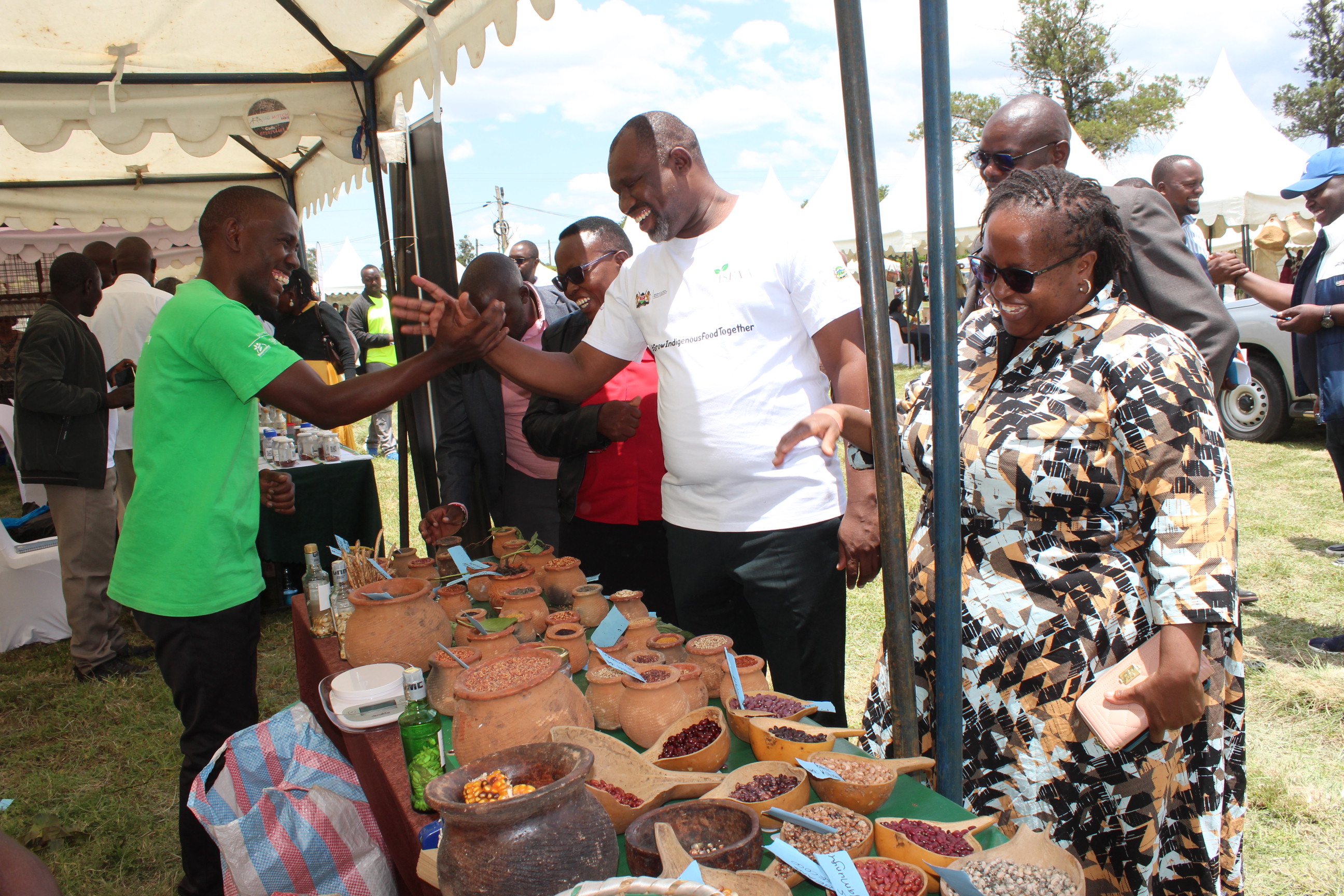 Laikipia Deputy Governor Reuben Kamuri with Dr Martin Oulu from ISFAA
and Ann Maina from BIBA Kenya during an Indigenous Seeds and Harvests
fair in Nanyuki
Laikipia Deputy Governor Reuben Kamuri with Dr Martin Oulu from ISFAA
and Ann Maina from BIBA Kenya during an Indigenous Seeds and Harvests
fair in NanyukiAs the effects of climate change continue to be felt in many parts of the country, more Kenyans are facing food insecurity and poor nutrition.
According to the 2025 Global Hunger Index, about 20 million Kenyans are undernourished as the country faces serious food insecurity that is exacerbated by the high cost of living and reduced purchasing power.
But players in the agriculture sector have been promoting farming practices aimed at boosting farmers’ resilience against climate change to improve their production, nutrition and returns.
In Nanyuki town, Laikipia county, hundreds of small-holder farmers congregated in an indigenous seeds and harvests fair aimed at showcasing the various varieties of seeds that have been proven to withstand both pests and erratic weather.
The event was organised by Grassroots Organizations Operating Together in Sisterhood (GROOTS) Kenya, Intersectoral Forum on Agrobiodiversity and Agroecology (ISFAA), Bio-diversity and Bio-safety Association (BIBA) Kenya, Seed Savers Network, Slow Food Kenya and Laikipia county government among others.
Jennifer Wanjiku, a farmer, explained to the Star that she struggled for years to feed her family on her small farm, as the beans and maize crops did worse and worse with the changing weather and poor soils.
But Wanjiku said her life took a drastic turn when she
learnt that the crops she had ignored for decades effortlessly did well in her
farm and had the capacity to sustain her family.
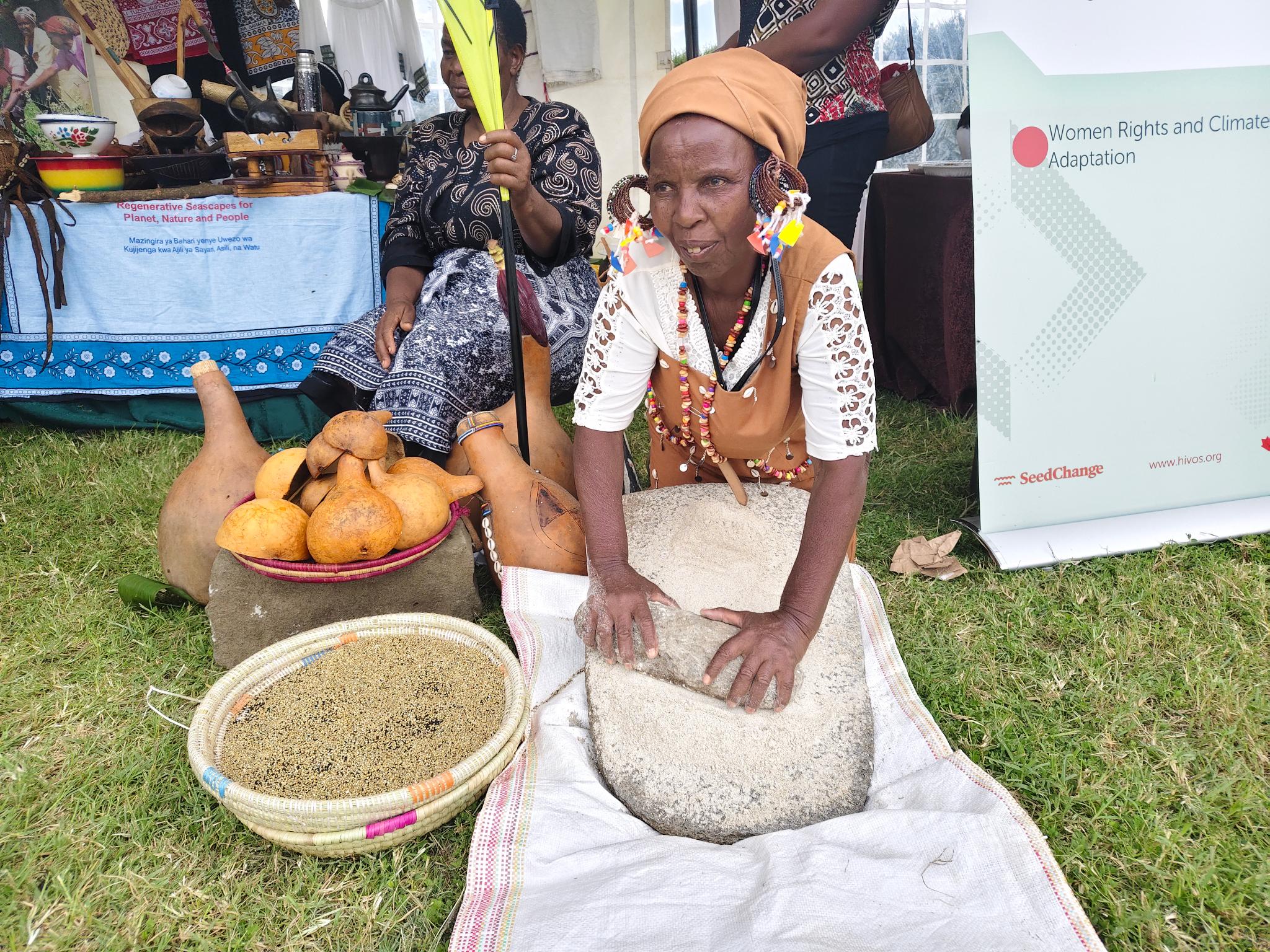 Jenniffer Wanjiku, a farmer from Laikipia county, showcasing the traditional cereal grinding
Jenniffer Wanjiku, a farmer from Laikipia county, showcasing the traditional cereal grindingTraditional grinding involves repeatedly crushing seeds or cereals between two stones while kneeling and stooping.
“This is what I have been growing in my farm now,” she said, pointing to an array of traditional cereals including sorghum, millet and maize.
“Once matured, I no longer take it to the posho mill to have it processed. I grind it using these stones and it’s much sweeter,” she said.
Next to her stall was Charles Macharia, who showcased various crops that are commonly regarded as weeds and which he said have medicinal value.
Macharia also taught many attendants the benefits of consuming small amounts of traditional brews that were culturally not consumed for the alcohol content but for health purposes.
In his stand were red indigenous bananas that he said were facing extinction in the country despite being highly nutritious due to their relatively low sugar levels.
Christine Lawatachum said she travelled from Baringo to showcase products she had made from bee products such a milking cream that she said preserved cows’ udders and a fire serum that heals scalds almost instantly.
“I also have a cough syrup that I’ve made from honey, lemon, ginger and garlic that will sooth your cold fast,” she said.
In another stand, Cecilia M’mburugu from Laikipia county
proudly displayed a four-and-half feet tall banana bunch that she said she
had grown over a period of two years.
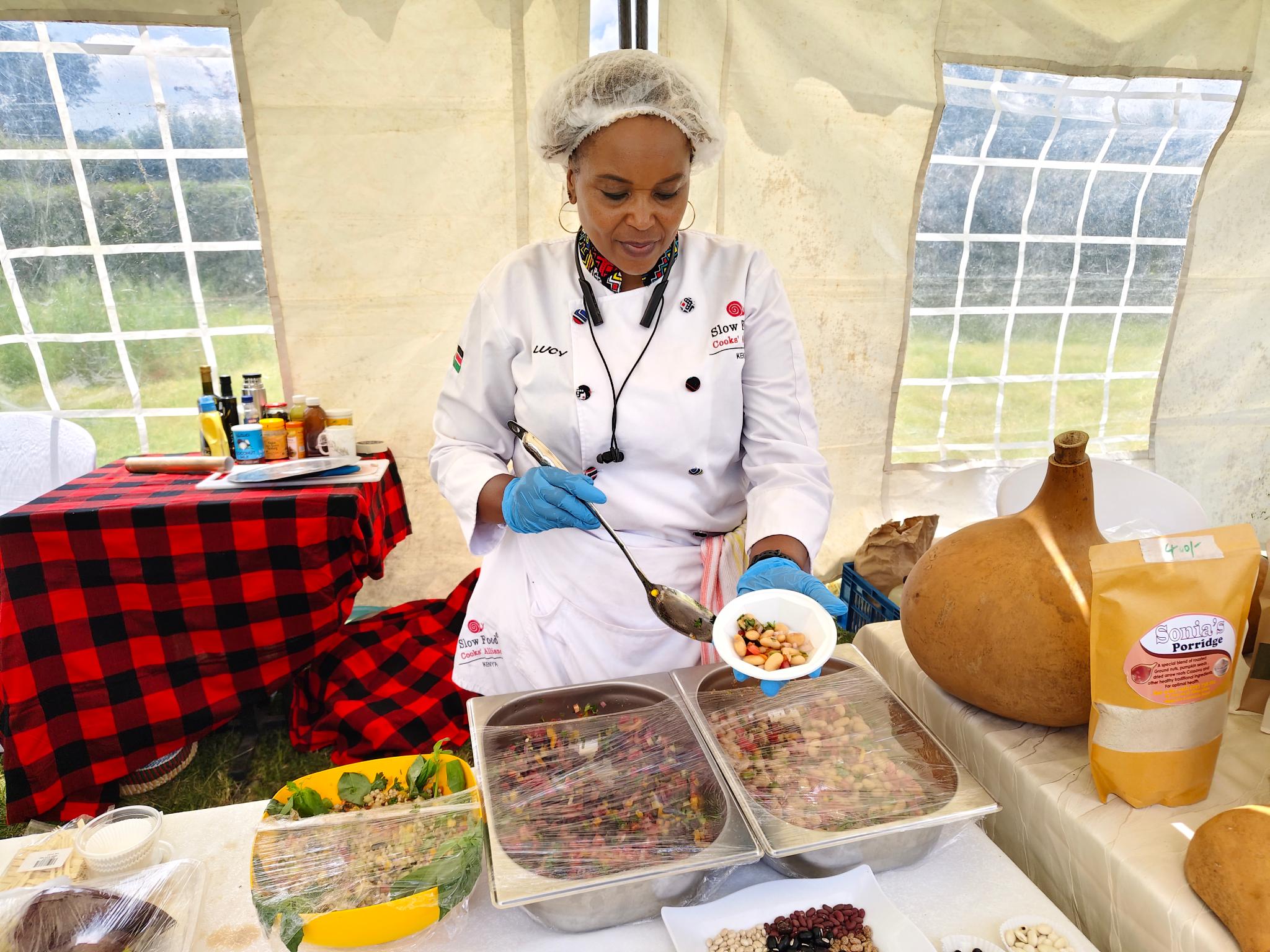 Some of the indigenous seeds displayed during a fair in Nanyuki, Laikipia.
Some of the indigenous seeds displayed during a fair in Nanyuki, Laikipia.“This bunch can only be carried by about four men because it’s so heavy and I only grew it using conservation practices such as digging trenches around it to hold moisture and mulching,” she said.
Anne Maina, the national coordinator of BIBA Kenya, underscored the need for small-holder farmers to embrace indigenous crops to boost their harvests and improve their health.
Together with other partners, the organisation has been promoting agroecology and has played a role in the establishment of supportive laws in numerous counties including Murang’a, Vihiga and West Pokot, and the National Agro-ecology Strategy.
Farmers, she noted, have been struggling to practice indigenous farming due to the limitations imposed by the Seeds and Plant Varieties Act that prohibits exchange of uncertified seeds and imposes a Sh1 million penalty or a two-year jail term for offenders.
This, she pointed out, has worked to the disadvantage of farmers and indigenous crops, some of which are facing extinction due to under-cultivation.
She however added that a case filed in Machakos by a section of farmers is set to be concluded on November 27 when the court is expected to give a ruling.
“We are seeking a constitutional interpretation of the act vis-à-vis the constitution which holds that indigenous knowledge should take priority”.
Maina lauded the government, however, for acknowledging farmers’ plight and starting the process of reviewing the act with the support of partners.
The review will help players push for the promotion of agroecology and farmer-managed seed systems, with small-holder farmers credited with the production of over 70 per cent of the food crops consumed in the country.
ISFAA coordinator Dr Martin Oulu noted that mainstreaming production of indigenous foods would help reduce health complications related to consumption of unhealthy foods and harmful agro-chemicals.
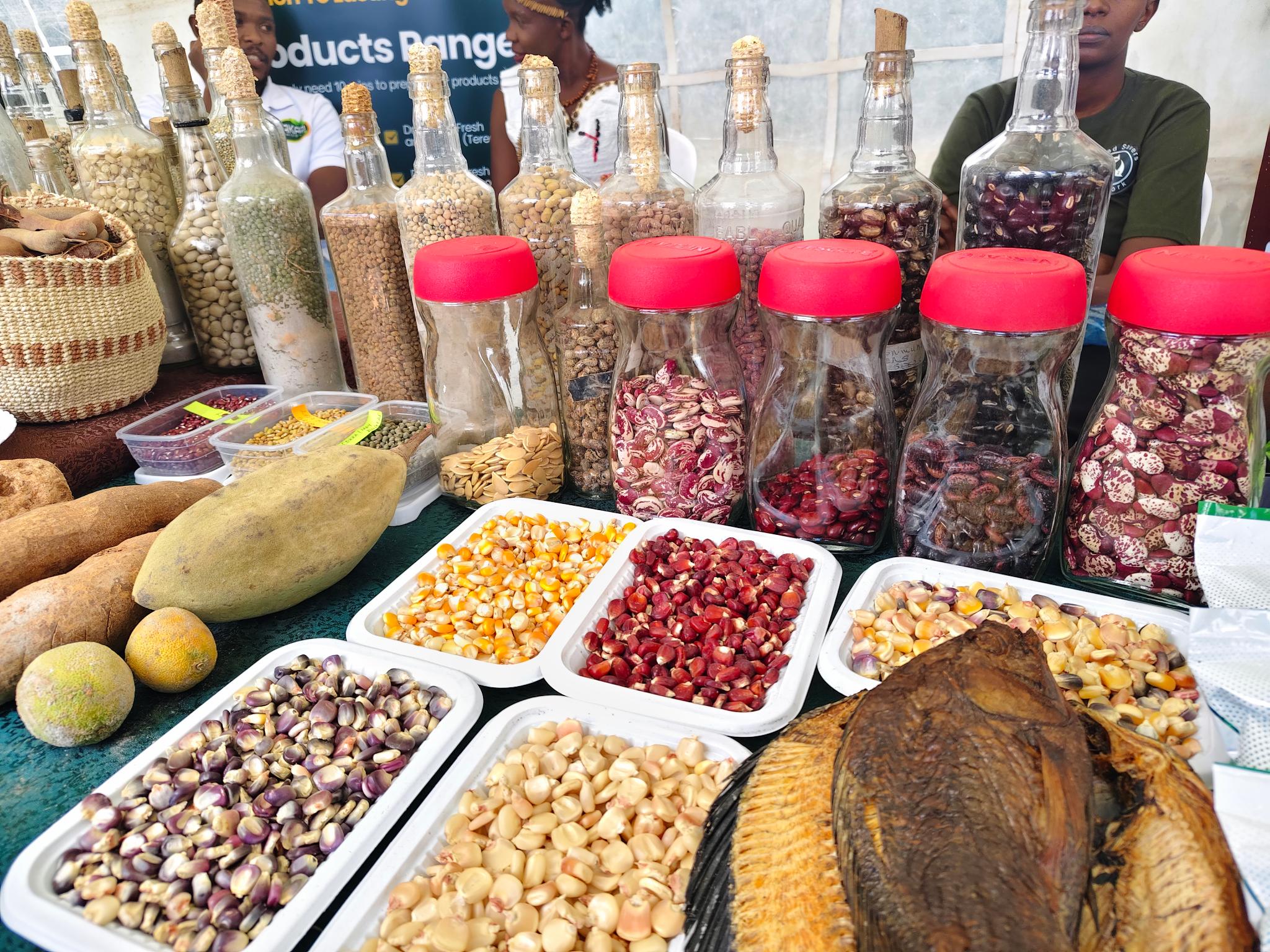 Dried cereals preserved in airtight containers for later use.
Dried cereals preserved in airtight containers for later use. “We need to go back to our roots and grow and consume the crops that our forefathers survived on. We also want both national and county governments to promote indigenous crop farming and ease access of seeds to farmers,” he said.
Oulu emphasised the need for the government to establish favorable policies that allow farmers to produce healthy foods and ensure indigenous knowledge and skills are not discriminated against.
He criticised attempts by the state to promote production of genetically modified organisms that he said will not solve food insecurity.
“This is why we’re promoting indigenous crops, because we believe they hold the solution to our perennial food shortages. Indigenous technologies are well known by farmers because they have been practiced for decades”.
According to Crispus Mwangi, the founder and director of Institute for Food Justice and Development, many Kenyans having been consuming over-processed foods, compromising their health.
During processing, he explained, lots of nutrients are lost while additives are included, with the end product becoming a food product.
But human bodies are designed to consume high nutrient foods, which he said results in high prevalence of non-communicable diseases that include cancer and diabetes, and obesity.
“We need to reduce consumption of ultra-processed foods and embrace whole foods with fibre and nutrients that were taken by our grandparents. We need to be intentional and bring them back to our foods and farms”.
The National Centre for Biotechnology Information confirms that about 51 per cent of Kenyan adults currently suffer from at least one chronic illness.
Eunice Mwangi, who is in-charge of strategic leadership
under Groots Kenya, decried failure by the government and stakeholders to
recognize the role played by women in food production and empower them more.
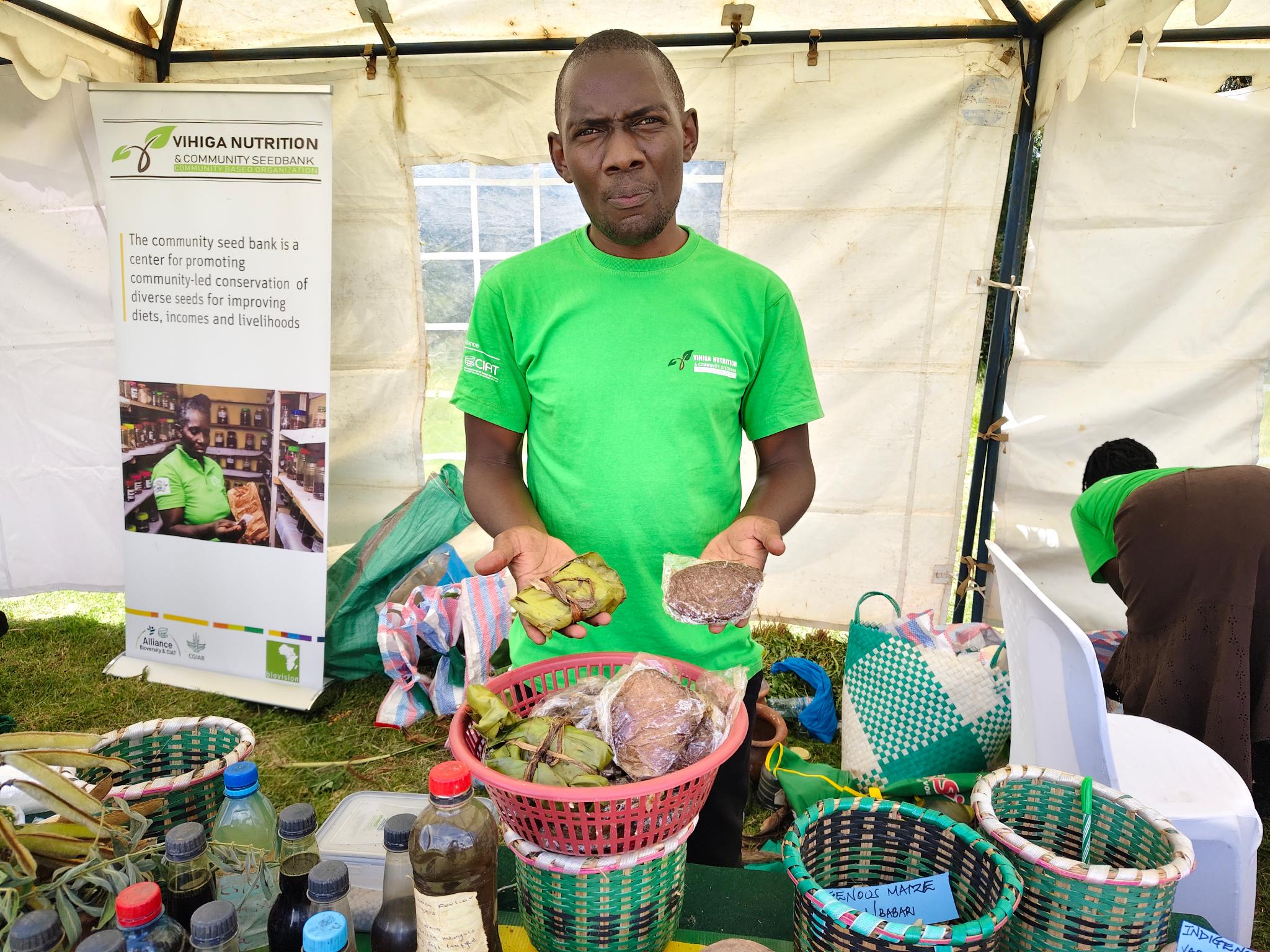 An exhibitor displays foods from indigenous crops during an indigenous seeds and harvests fair in Nayuki, Laikipia county.
An exhibitor displays foods from indigenous crops during an indigenous seeds and harvests fair in Nayuki, Laikipia county.Women, she said, have been the custodians of indigenous seeds and food banks in their households while providing most labor in farms.
The organisation that empowers women supports over 5,000
women's groups in the country and had over 200 women showcase their various crops
varieties during the fair.
Francis Muia from Slow Foods Kenya said the organisation has
been working with the Cooks Alliance to train Kenyans on how to prepare and
consume indigenous foods for maximum nutrition and better taste.
“We’ve had monumental inter-generational exchange of
information in this event which is crucial in ensuring indigenous knowledge is
passed from one generation to another”.
“We’re also promoting plant proteins to reduce over-reliance
on animal proteins and diversify our diets. We have trained people today to
prepare and mix various foods and even shared the ones we have prepared”.
Laikipia Deputy Governor Reuben Kamuri said the
county has been providing more extension officers to train farmers on
agr-ecology and indigenous crops farming.
Further, the county is undertaking a water provision program
to ensure residents access water within a 4km distance and desilting
dams for irrigation.
“Food security is key to our agenda. Without it, the economy cannot do well. We’re putting in place measures to support community seeds banks and cultivation of diverse crops using smart farming practices”.












